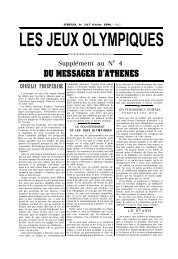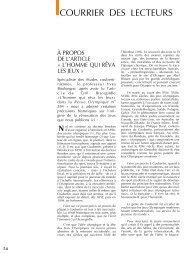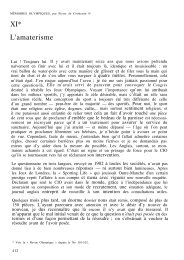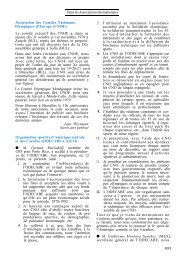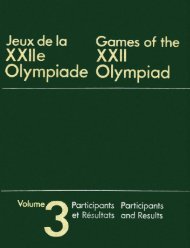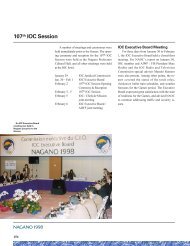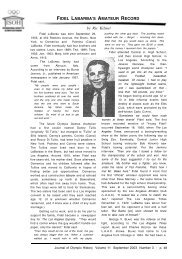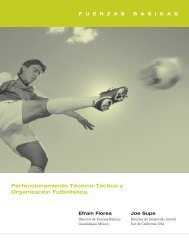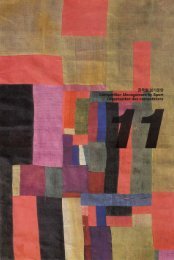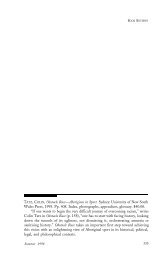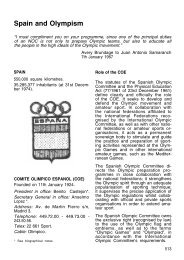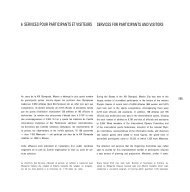Sport Development and Mexican Nationalism - LA84 Foundation
Sport Development and Mexican Nationalism - LA84 Foundation
Sport Development and Mexican Nationalism - LA84 Foundation
Create successful ePaper yourself
Turn your PDF publications into a flip-book with our unique Google optimized e-Paper software.
Journal of <strong>Sport</strong> History, Vol. 18, No. 3 (Winter, 1991)<br />
Against the backdrop of the Tlatelolco massacre, where government forces<br />
killed dozens of students <strong>and</strong> workers in a plaza near downtown Mexico City,<br />
<strong>and</strong> of related repressive state actions, it is debatable whether Mexico’s image at<br />
home <strong>and</strong> abroad was markedly improved. There are also serious questions<br />
about the physical <strong>and</strong> economic benefits derived from the national <strong>and</strong> foreign<br />
expenditures. Yet, the Olympics <strong>and</strong> the Mundial combined did lead to the<br />
construction of important facilities for the training of athletes <strong>and</strong> the practice of<br />
sport, exposed <strong>Mexican</strong>s to the example of world-class performances in many<br />
sports, brought to Mexico experts in various sports-related fields who shared<br />
their knowledge, <strong>and</strong> inspired <strong>Mexican</strong> competitors to perform at admirable<br />
levels. 41 And while historians with long memories may still lament the sufferings<br />
of 1968, it seems that tourists <strong>and</strong> sports fans, like conservative politicians,<br />
carry a more favorable, or at least neutral image of Mexico’s h<strong>and</strong>ling of the<br />
total process. The decision to award the 1986 Mundial to Mexico, after Colombia<br />
withdrew, suggests a sense of confidence in <strong>Mexican</strong> organizational abilities,<br />
a reward for the ruling PRI <strong>and</strong> the government, if not the entire<br />
population. 42 But, after all, it was government <strong>and</strong> its business allies that set<br />
the policies which earned Mexico its status in world sporting centers. 43<br />
Typical, perhaps, of the most optimistic, nationalistic-one might say,<br />
romantic-feelings of some <strong>Mexican</strong>s who took such pride in the achievements<br />
of the 1960s, were those expressed by one Eusebio Castro in a short poem/chant<br />
written in celebration of the XIX Olympiad which links the spirit (flame) of the<br />
ancient <strong>and</strong> modern Olympic games with the spirit (sun) of the <strong>Mexican</strong>/Aztec<br />
past to illuminate the hope for a better world. The arrival from the east of the<br />
Olympic torch is equated symbolically with the reappearance of the mythical<br />
god-man, culture-hero Quetzalcóatl whose predicted return centuries before<br />
had anticipated an era of greater peace. 44<br />
Winners or Losers?<br />
The <strong>Mexican</strong> approach to sport after 1920 suggests more continuity than<br />
discontinuity when compared to the Porfiriato, a conclusion which seems<br />
consistent with general trends in current <strong>Mexican</strong> historiography. Without<br />
41. Arm<strong>and</strong>o Satow, “1968: el mejor resultado de la historia,” Uno Más Uno, No. 962 (July 16, 1980), 31.<br />
42. Before the 1970 Mundial, FIFA commissioned a report on the soccer tournament held in Mexico in<br />
conjunction with the 1968 Olympics; the author labeled that competition “better organized’ than any he ever<br />
attended. See Dettmar Cramer, Olympic Football Tournament 1968 ([n,p.]: FIFA, [1969]).<br />
43. Alastair Reid, “The <strong>Sport</strong>ing Scene: Shades of Tlachtli,” The New Yorker 46 (July 18, 1970: 60-71;<br />
“México ‘86,” Vogue (México), Special Issue (1986). In 1986 the urbane Reid had little good to say for Mexico or<br />
the quality of the soccer, except for that displayed by the Argentine Diego Maradona <strong>and</strong> in the Brazil v. France<br />
quarter final classic; “The <strong>Sport</strong>ing Scene. Mundial Notebook: Ariel v. Caliban,” The New Yorker 62 (September<br />
29, 1986): 45-60.<br />
44. Eusebio Castro, Olímpico 68 (México, D.F.: Impresora Ambris, 1968). Representative lines from the<br />
chant include: “Mirad: Del ‘mar divino’ / Donde ardió Quetzalcóatl / Mudándose en lucero, / Se anuncia ya la<br />
aurora / Del último relevo / Con luciente antorcha /. . . / !Es fuego del Olimpo! / . . . / Anunci<strong>and</strong>o el portento: /<br />
RESURGE QUETZALCOATL! / iY ESTALLA EL FUEGO NUEVO / QUE AL MUNDO SALVARA!”<br />
[“Behold: From the ‘divine sea’ / Where Quetzalcóatl blazed / Transformed into the Morning star / The dawn is<br />
approaching / In final relief / With shining torch /. . . / It’s the flame from Olympia! / . . . / Proclaiming the<br />
wondrous news: / QUETZALCOATL IS REBORN! / AND BURSTS FORTH THE NEW FLAME / WHICH<br />
WILL SAVE THE WORLD!“]<br />
360



